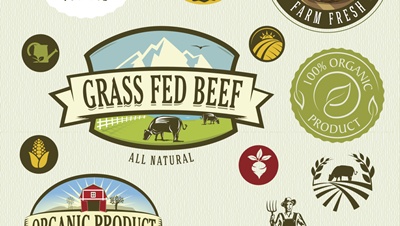
You might find yourself spending a little more money to get high-quality organic produce—but don’t begrudge the extra spend. You get so much for your health (and the planet) in return.
When you buy organic, it means you’ll get fewer pesticides, no genetically modified (GMO) ingredients and safer environmental farming practices. Organic crops don’t have fertilizers, herbicides or fungicides, and organic foods typically deliver more nutrients and better quality so you can really taste the difference.
The same goes for organic and grass-fed meats and other animal products. These are preferred by many over conventional and factory-farmed animals, which can contain antibiotics, steroids and even growth hormones. And you’ll also have the peace of mind that animals on free-range farms are well-treated.
Despite the positives, there are plenty of people who aren’t on the organic bandwagon. Here are a few of the common reasons people don’t buy organic—and why they don’t make a whole lot of sense.
Organic Foods Cost Too Much
On average, organic foods are 30% higher in price than conventional foods. And with food budgets tightening up, organic shopping might get put on the backburner. But don’t get down on the idea yet, because there are ways around the higher costs. Shopping sales, couponing and flash-freezing extras instead of throwing them out are a few great ideas to help stretch your dollar.
If you’re on a budget, it can be fairly expensive to shop for food period, not to mention organic. So it’s best to plan a list of exactly what you need so that you aren’t tempted to impulse buy. The Environmental Working Group’s “Dirty Dozen” is a list of 12 fruits and vegetables with high amounts of pesticides—apples and strawberries are the worst—so make these an organic priority. And remember, homemade meals from quality whole foods are always more budget-friendly than relying on takeout and processed entrees from the freezer.
Too Little Information to Justify the Expense
Organic tends to be a real buzzword these days, but just because the product is organic doesn’t mean it’s healthy. People may be wary when it comes to educating themselves on why organic food has added health benefits, although there is plenty of info available about why standard produce and factory-farmed meat are not ideal. There is much less nutrition for one thing, but the poor conditions of factory-farmed meats can be alarming as well. Doing a little research on your food before you consume it is a very good habit to start.
Who Says Organic is Better, Anyway?
For every good source of information, there is also misinformation, with news articles and opinion columns arguing the difference between organic and conventional foods. Be skeptical! Some articles point to studies that show minimal differences between organic and conventional produce; a 2012 study from Stanford University in California didn’t find strong evidence that organic foods were healthier or provided increased nutrition than conventional produce. However, there have been other studies indicating the nutritional superiority. One extensive review of 41 studies found that organic produce can have as much as 27% more vitamin C, 29% more magnesium and 21% more iron, the Journal of Alternative and Complementary Medicine reports.
Shopping Organic is Too Darn Tricky
The local health food store isn’t the only place to get your organic food. You can save money on organic produce and meats when you shop at farmers’ markets or join forces with local organic food co-ops and community-supported agriculture (CSA) programs. CSA programs typically deliver organic food boxes to your door for an affordable price from spring to autumn. Another way to reap the benefits is to grow organic food yourself. There is a certain satisfaction from picking your own fresh produce right from your backyard.
When it comes to your health, you don’t want to make excuses. Shopping organic has a long list of benefits to set you on the path to healthy, inspired eating. Shop smart and eat fresh!
Sources:
Mateljan, G., The World’s Healthiest Foods: Essential Guide for the healthiest way of eating (Seattle: George Mateljan Foundation, 2007), 127, 171.
“Organic vs. Non-organic Foods,” Licious Living website; http://www.liciousliving.com/main/extras/organic, last accessed April 21, 2014.
Hancock, K., “Yes, You Can Afford to Eat Healthy! Money-Saving Tips for Buying Organic,” iVillage website, July 31, 2013; http://www.ivillage.com/money-saving-tips-organic-foods-organic-food-bargains-organic-food-coupons/3-b-373936#373919.
Chait, J., “8 Reasons Why Consumers Should Buy Organic Food,” About.com website; http://organic.about.com/od/OrganicConsumerRelations/tp/8-Reasons-Why-Consumers-Should-Buy-Organic-Food.htm.













